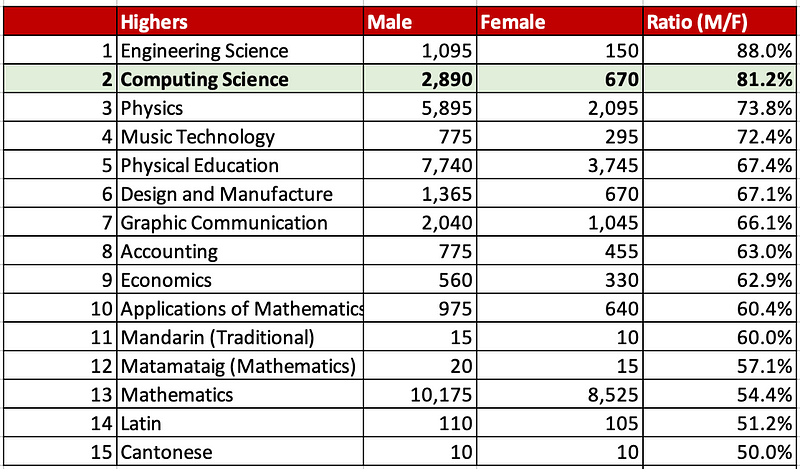Gender-biases, Practical Subjects and Computer Science at School

Gender-biases, Practical Subjects and Computer Science at School
And, so, our future economy is defined by those at school at the current time. The success of our society and economy in the future will be defined by how well we have set up our future skills base. I highlight the word “we”.
If we fail to build a foundation for the future, our economy will fall, and we will be letting down our future generations. Overall, it is not an easy thing to fix in the future, so we need to get our future workforce right at the most fundamental level — at school. In fact, there is no better investment that a country can make than in its education infrastructure — especially at school. But, we need to invest in the right areas — and with Mathematics, English and Science being at the core of this.
So, we have some fundamental questions to ask … why do we not produce enough graduates will coding skills, and why, in areas of technology, engineering and computer science, do we have more male graduates than female ones? Well, the root of these things perhaps go right back to school, and where coding is just not seen as a popular subject, and that it is already dominated by male pupils.
N5 qualifications
And, so, the N5 (National 5) qualification results in Scotland have been issued for 2023, and those looking to see great advancements in STEM and language subjects will be slightly disappointed, with Computer Science showing only a 7.1% increase between 2019 and 2023, while Physics and Chemistry have dropped.
The strongest performance for changes were in areas of cookery (up 51%), woodwork (up 50%) and metalwork (up 35.2%). One great advancements is the overall increase in Maths (for Mathematics and Applications of Mathematics). Practical Cookery, Woodwork and Metalwork and have overtaken Computer Science over the past few years, and where Physical Education has moved ahead of most of the science subjects. For languages, Spanish seems to be holding on fairly (possibly due to Spain being popular as a holiday destination) but French, German and Italian all show drops:


Highers
For Highers, Maths and English show small increases, but it is Physical Education and Modern Studies that show the most impactful changes. Computer Science has increased by 10.1% between 2019 and 2023, but Chemistry falls by 3.6% and Physics falls by 4%. While Biology also falls, the demand for Human Biology has more than offset this. Overall, Biology seems to be in a healthy state. The greatest worry, though, is that language subjects are dropping significantly, with only Spanish making it into the Top 20 (but still falling from 2019.


Gender balances
The root of the lack of female graduates in technology perhaps goes back to school. If we take the gender balance for the mainly male-dominated subjects in 2023, we see that Computer Science has registrations at N5 has have three times more male than female candidates. We also see that Physics is also strongly biased toward male candidates:

Physical education, too, seems to have strongly biased towards the male gender. For female-biased subjects, we see that languages and the creative arts are the most popular, with Biology being the most strong female-oriented science subject:

But, it gets even worse at Higher level, and where the gender bias in Computer Science increases to more than 4 males to 1 female in classes (81.2%). Overall, Computer Science moves from 78.4% to 81.2%, and Physics from 71.6% to 73.8% — for male/female gender balance:

Conclusions
The N5 level shows a shift away from academic study towards more practical subjects, and at the Higher level, Biology is doing well, but the other two science subjects (Physics and Chemistry) are falling. But, for Computer Science, it just plods along and falls in behind Religious Education at the Higher level.To me, if there’s a move to move practical subjects, then programming should be top of the list and should be a subject for every child at school to learn. I have no idea why — at school — Computing has to be a “science” — it should be as practical as woodwork. It could be likened to a subject named Calculator Science — but where using a calculator is a practical skill rather than a scientific study. We should leave the “science” part for university/college education, and just get every child coding. Specialisation can come later in their lives.
All it needs is for a government leader to define, “That every child leaving school will have programming skills that would allow them to program at a good level” … and that would build a foundation for the future. For just now, it is a subject that tries to cover too many bases and should just concentrate on getting kids into coding and showing how great it is as a career — no matter which field they go into.
We need to get our kids coding — or we will switch off another generation. For our tech-drive era, we need people who can drive technology and not just use it.